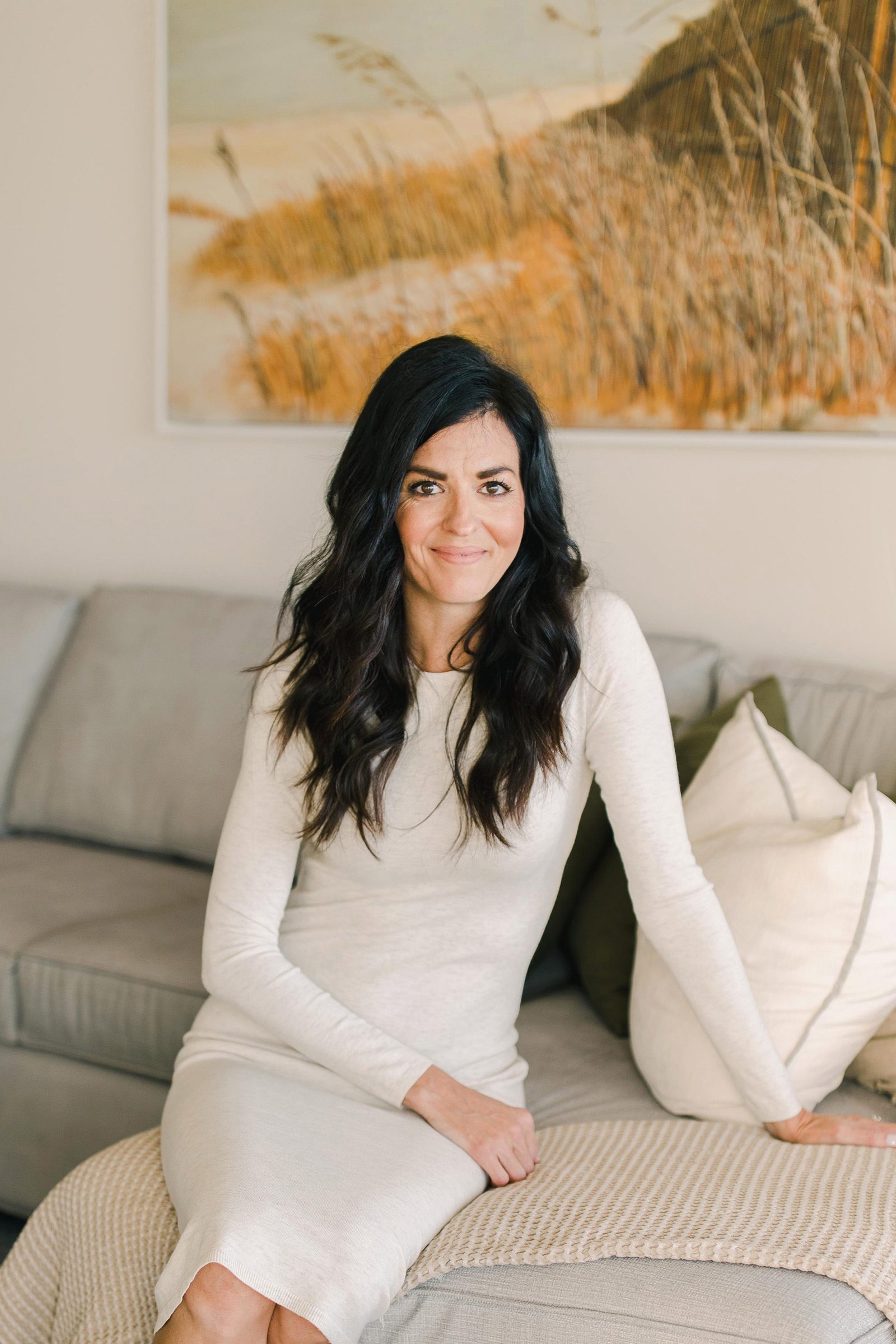In the first official Season One episode of the Dig Your Well Podcast, listeners are introduced to Christian author, speaker, and Bible teacher, Jane Johnson. Throughout the episode, Jane shares her personal story of overcoming bookended griefs of infertility and loss, and how her determination to study God’s Word for herself helped her to cling to God with white-knuckle faith knowing that, through it all, He was intentionally writing her story, for His glory.

Hello, friend, and welcome to the very first episode of the Dig Your Well podcast! Now, my first inclination is to jump right into the meatiest parts of whatever Bible passage it is that I’m currently morning-soaking in but, before I do, I need to tell you a little bit about how I got to be here, doing this, talking so candidly and vulnerably with you and teaching the Bible the way that I do. Because once you know that, then all of this will suddenly make a whole lot more sense. So, while my upcoming episodes will be much more teaching, this one is almost exclusively story-telling.
Now, my first inclination is to jump right into the meatiest parts of the episodes that I have prepared for you this season but, before I do, I need to tell you a little bit about how I got to be here, doing this, talking so candidly and vulnerably with you and teaching the Bible the way that I do. Because once you know that, then all of this will suddenly make a whole lot more sense. So, while my upcoming episodes will be much more teaching in nature, this one is almost exclusively story-telling.
I first gave my heart to Jesus as a young 13-year old girl in the middle of a youth event mosh pit. Someone up on the concert stage held a microphone to their lips and told the story of the gospel, gave an invitation to embrace it. I was too embarrassed to raise my hand or walk up front, but I silently nodded my heart yes. It wasn’t until college that I shifted my faith into a higher gear and begrudgingly got baptized in my jeans and sweatshirt in a pool on my college campus after being told for years that I wasn’t really saved because I wasn’t baptized. Sprinkling as a baby didn’t count, they said. But it counted for me, and that was all that mattered, until I suddenly and very spontaneously wanted to be baptized. Then, that counted too.
My extroverted friend who I got baptized with dragged introverted me to the church she had been going to. I scribbled Bible teaching notes as quickly as my hands could write the words, raised my hands in worship because I couldn’t keep them at my sides, and I befriended my college pastor’s wife. She was the magnetic type – a blonde bombshell everyone wanted to know and everyone else considered their best friend. She loved really well, is what I’m trying to say, really authentically, without even trying. She invited me to her home for naptime conversations while her oldest, not quite a toddler then, slept upstairs. I know now how a young mother carefully guards those sleeping hours, I know now what a big deal that was. But she didn’t make it a big deal, she let me into her home and her life where she poured into me and discipled me.
The name of this podcast (and the name of my entire ministry, Dig Your Well) was born out of those hours we spent tucked up together on her couch. I tell the story in my book, Mercy Like Morning, of when I had been lamenting my struggle through singleness and Shawna taught me her most important life lesson. Of course, she didn’t announce it that way – it was almost an off-the-cuff remark that just … stuck to my bones in a way like nothing else ever had before.
“Dig your well,” she said. It was a reference from Psalm 84:6 and the people who pilgrim-pass through the Valley of Baca and make it a spring—or, as it can also be translated, a well. The pilgrims traveling through the area would stop and rest and draw water from that well before continuing again on their way.
“Dig your well for yourself,” she said, “and also for the people who follow along after you. And do it now, while you are single and can dig a little bit deeper and linger a little bit longer.” She had a point. I really had nothing else to do but pass the hours drinking coffee, studying for exams, working my part-time job, and dreaming of how the rest of my life would shape up.
Shawna had been digging her own well for years with regular quiet times, letting God fill it with the water of His Word. And on those afternoons, I sat and drank from the wisdom of her deeply-dug well.
Of all the things she taught me, that was what stuck. To dig down—and dig deep. Every day, coming to God’s presence whether or not I wanted to, whether or not I had the time or the inclination. In the good days and the ones full of tears. Dig in and dig down and dig deep into His Word. So that when life got busy, and there was marriage and a mortgage and little ones at my morning-feet, I could draw from my dug-out-daily well.
And when I walked through the desert, I could drink from it.
In the years that followed, my life slowly began to look more like hers. I started dating my husband, traded my last name for his, graduated college with a photography degree, and we moved to a mountain town 2-½ hours east to help start a church all within a 16-month timeframe. And moving out of town also moved me outside of the fishbowl of a pastor’s wife life in which Shawna lived. Slowly but surely, she saw me as more of a friend-friend and less of a ministry-friend. Our discipleship relationship blossomed into the kind of friendship you seem to only read about. The kind where your best friend almost knows you better than your husband does, and certainly knows your high-maintenance coffee order that he, twenty years in, can’t seem to get straight.
Two years after becoming a Johnson, in the typical timeframe that most couples seem to embrace, we began trying for a family. A year after that, I started my photography business. Two years later, I added on a graphic design side-hustle. My brain couldn’t stop creating and designing and making beautiful things for incredible clients. But my body couldn’t seem to get things together enough to conceive and create something entirely on its own. I tried everything they tell you to – temperature-taking and ovulation tracking, vitamin-swallowing and wine-ditching and laying perfectly still for whatever magical amount of time has been touted. I tried acupuncture and tinctures and supplements and massage. Ultrasounds and blood tests and exams and dyes. Still, month after month, year after year, the waiting dragged on.
I finally got a phone call one afternoon from the last round of testing that would draw our line in the sand.
“You have a low-percentage chance of getting pregnant on your own,” the doctor said. It was time to consider other options: IUI, in-vitro fertilization, even adoption. Neither Josh nor I felt comfortable about any of those options. Are they miracle-avenues of God’s provision for children? Absolutely, yes, for other couples. But not for us. So we decided to keep doing what we had been doing for the last four years. Nothing. No fertility treatments. No drugs. No chlomid. No fertility jump-starters. Nothing but wait for God’s miracle.
Remember the Valley of Baca I just talked about? Turned out Baca meant “weeping.” I was getting quickly acquainted with that weeping-valley.
A year later, Shawna was diagnosed with stage four colon cancer. Eighteen months after that? She was gone. My grief was indescribable.
After Shawna died, I stopped Bible-digging for awhile. Everything sounded trite. Well-intentioned messages from our closest friends quoting hopeful verses were nauseating. I ignored it all, gave myself some time to just float, knowing that God would never, ever let go of me, so I could let His anchor hold me for a little while. But I also knew that if I didn’t find some way to grip back onto God, to start digging again in His Word, the grief would consume me. So, I gave myself a specific timeframe to begin crawling my way out of grief.
When I eased my way back into the waters of morning reading, I had a hard time finding where to land. It turns out there aren’t any Bible stories of waiting-for-babies women who also buried their best friends. So, I picked the most cynical Bible book I could find. I began to read Ecclesiastes, found solace in the emptiness of it all, the endless what’s-the-point vanity, and, still, God tenderly lifted my always-weeping eyes up to His in the “I see you” way that only He can.
I sat in bed one February morning just a few months after Shawna died, the down comforter pulled up tightly around me. Another month had come and gone. Another period with it. I cried the same old tears. We had officially passed the seven-year mark and Shawna’s death was still very fresh. So that 84th-in-a-row-no was extra heart-wrenching. I had just started reading Ecclesiastes 3 and wrote verse two on the prayer journal line just beneath my 84-month acknowledgement.
There is a time to be born, and a time to die. The words pulled at me and I took a peek at the Hebrew definition of that “born” word and was startled to find that it wasn’t speaking of the person being born. It meant “to bear or bring forth, as a mother.” The verse can literally be read “There’s a time to become a mother. And there’s a time to die.”
No, there aren’t any Bible stories of waiting-for-babies women who also buried their best friends. But God led me directly to the one verse in the entire Bible that pointed to my pain and specifically detailed my bookended sorrows. That morning, when the sorrow tried to
choke me, God squeezed tighter still and whispered “I’ve got this. I’ve got YOU. This time, your story? It’s all in my hands.”
I had no idea when we started trying to have a baby how long our wait for a family would be. Or how rich and wildly heartbreaking and dripping all over with glory our story would be written. It turns out that Joel knew what he was talking about when he wrote of God redeeming those locust-eaten years. The ones that seemed worthless. Fruitless. Pointless. Mine absolutely felt that way, but I refused to let go. I forced myself to keep digging, keep teaching myself how to look up word definitions and to keep cross-referencing and keep filling the gaping holes of Scripture that were left in the half-inch marginal gaps that spanned sometimes twenty years. There had to be more to those waiting stories. And I was determined to find it. So, through it all, I dug deeper and deeper into His Word. And over and over again, God met me intimately, deep inside of my private pain in the way that only He can, step for step.
For me, all of this started in the margins. I experienced a bookended kind of heartache that I couldn’t possibly comprehend, a grief that the Bible doesn’t really touch. A stretched-out-wait that is left to the half-inch spaces between chapters, and commentaries explaining them that are authored by men who weren’t created to create life inside of their bodies.
Listen, I know it sounds trite, and these are the kidneys of words that I would have a visceral reaction to in my still-grieving days, but I’m here to tell you: God has a plan for all of your pain. Every last piece of it. I can tell you with absolute conviction that your greatest gift is born out of your most private pain. This podcast is a testament of that. Because, through my pain, as I walked through the valley of weeping and the valley of death, I learned to dig and I learned how to study the Bible in a way that not a lot of people around me do. And, in many ways, those waiting years prepared me for these most recent ones out of which this podcast season was born.
Shawna and I always used to tell each other that someday she would be cancer free. And someday I would have a family. It ended up happening a little bit differently than we dreamed it would. But, there is still so much glory in it. Because our first tiny miracle was naturally and quite unexpectedly conceived in the same month as the ten-year anniversary of when we first started trying for him. Nothing changed. God’s timing had just finally turned up on the calendar. And his due date was two days before Shawna’s death anniversary. Because He makes all things new. And He makes bitter waters sweet. And He redeems heartbreak.
What happened next was a whirlwind: I wrote my first book, Mercy Like Morning, while our first babe was still a newborn, and released it into the world when I was nine months pregnant with our second miracle babe. And six months after that? We found out about miracle-babe #3.
These days of reading your Bible and studying it and getting to know it intimately are you digging your well for yourself. And all of the knowledge you gain and wisdom you dig out? It’s the water for the people to drink who follow along after you. This podcast, right here, right now? It’s you drinking from my well that I dug every day, coming to God’s presence whether or not I wanted to. I dug in and dug down and dug deep into His Word. So that when I walked through the desert, I could drink from it. And years later, after my miracle had come three times over and the desert was behind me? You could too.
Before I let you go, I want to tell you one more story from when we were eight years into our family wait. I was in Atlanta sitting in the living room of a very dear friend, chatting with her and her husband at, like, 2:00 in the morning and telling them that I was about to get on stage two nights later at a women’s conference in front of 250 women and tell them at one point during my message that, even though it had been eight years without a single positive pregnancy test, we believed that God would do His miracle.
My friend’s husband looked me straight in the eyes and said, “Jane, we love you. You know we support everything that you do 100%. But you do know that you sound crazy, right?” I knew I did. That night, as I got ready for bed, I stood in their guest bathroom and stared into the mirror, white-knuckkle gripping the edge of the pedestal sink, begging God to do the thing that I was very publicly believing Him for, to fulfill the promise He has undeniably given us. That’s what this season is all about – having the gall to believe God will do what He’s told you that He would. To step into it, and walk boldly in that unwavering faith.
In the next episode, we’ll talk about the difference between spiritual giftings and natural ones, and how your calling is entirely different from both of them. And, the thing about that is that there are many spiritual and natural gifts, but one thing that doesn’t exist is the spiritual gift of learning. That is universal and for every single one of us. That’s why I’ve created Digging Deeper Guides for every single episode. With these guides, you will have the opportunity to get the sense of a biblical word from each episode by looking it up in its original biblical language. You’ll pair a passage from each episode with another one in Scripture to see how, when combined, they provide a richer narrative. And you’ll have the opportunity to make it personal with a couple of open-ended questions that will lead you into a time of prayerful application. In other words, I’m teaching you how to dig a well of your own using your naturally-existing gift of learning that God has already placed inside of you.
This season, we’ll take a deep-dive into Deborah’s story to see how her gifting and her calling collide and how she gathered the gall to believe God in response. We’ll talk about the three ways that you can actually lose your calling and shore up any areas of our lives that are vulnerable to them. We’ll dig into the Holy Spirit anointing and calling-appointing, and the anonymous in-between that often stretches between the two. And we’ll round it all out with a really vulnerably discussion (on my part) of how to keep gripping on gall, even when, on paper, it doesn’t make any sense at all.
The first Digging Deeper guide is waiting for you right now at janejohnson.com/podcast.
And if you want to be immediately notified the second a new episode becomes available, you need to subscribe on your favorite podcast platform.
Ok, friend, that’s it for me. Thanks so much for being here!




